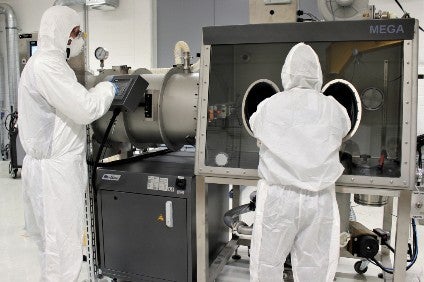
Innolith, a European developer of Li-ion cells, said it was commercialising new ‘its ‘I-State’ battery technology platform for use in electric vehicles (EVs) and e-mobility applications.
Using an entirely new battery chemistry, I-State is claimed to cut EV costs and increase vehicle range through a high energy density of 300Wh/kg (NMC811/Graphite) while improving both safety and performance due to its high voltage, high conductivity, non-flammable electrolyte that also enables an improved temperature range of -40C to +60C.

Discover B2B Marketing That Performs
Combine business intelligence and editorial excellence to reach engaged professionals across 36 leading media platforms.
The company said in a statement it had signed memoranda of understanding (MoU) with five customers for a production requirement of 100MWh per year for off-road, aviation and mining applications which included an agreement with Xerotech to develop battery packs for heavy duty, off-road mobile machinery and other electrification applications.
In the automotive sector, Innolith said it was “working closely with three of the 10 largest car companies and has recently signed an MOU with one of the leading EV manufacturers”. A spokesman told Just Auto: “Unfortunately, due to contract obligations the names of these companies… can’t be revealed.”
Innolith claimes it I-State platform is “well suited for applications that require both high energy and high power”. This is achievable due to the electrolyte’s “exceptionally” high conductivity, up to four times that of conventional Li-ion electrolytes. This combination of high power, high energy and improved safety means the I-State platform is said to be able to offer a significant improvement over conventional Li-ion and “suitable for the most demanding applications”.
Innolith developed the platform which will be manufactured through licensing agreements with automotive, industrial and battery companies with further details to be announced.
I-State cells use a new battery technology based on liquid inorganic electrolyte that can operate at higher voltages than traditional Li-ion battery cells. The higher voltage of the cells enables higher use of cathode capacity through usage of nearly 100% of available lithium vs 80% for Li-ion, over many stable cycles, and at high charge and discharge rates. The I-State higher voltage enables a significant reduction of cathode metals used in the cell, helping EV manufacturers to cut costs and produce vehicles that are closer to the cost of Internal Combustion Engine (ICE) vehicles. The 20% reduction of lithium, cobalt and nickel will help alleviate environmental and sourcing concerns, while typically reducing the weight of an EV battery pack by 7% to 8%.
I-State also enables stable cycling of manganese containing cathodes with reduced content of expensive nickel. The company is developing LMR (Mn-rich NMC) and LNMO chemistries jointly with “several large and well known [companies] in the market”.
New technology based on the I-State platform is in development to provide for both increased EV range with 350-400 Wh/kg energy densities, and for lower-cost EVs with lower CO2 footprint due to reduced use of expensive green metals versus existing commercial cells.
I-State is said to have been proven as a platform for development of LFMP and Na-based cells and Innolith made its first patent applications in 2020-2022.
Konstantin Solodovnikov, CEO of Innolith, said: “Conventional Li-ion has served us well for 40 years but has well known limitations for the future. I-State goes further, costs less and is environmentally more sustainable.”
See also: Gotion High-Tech claims battery break-through






